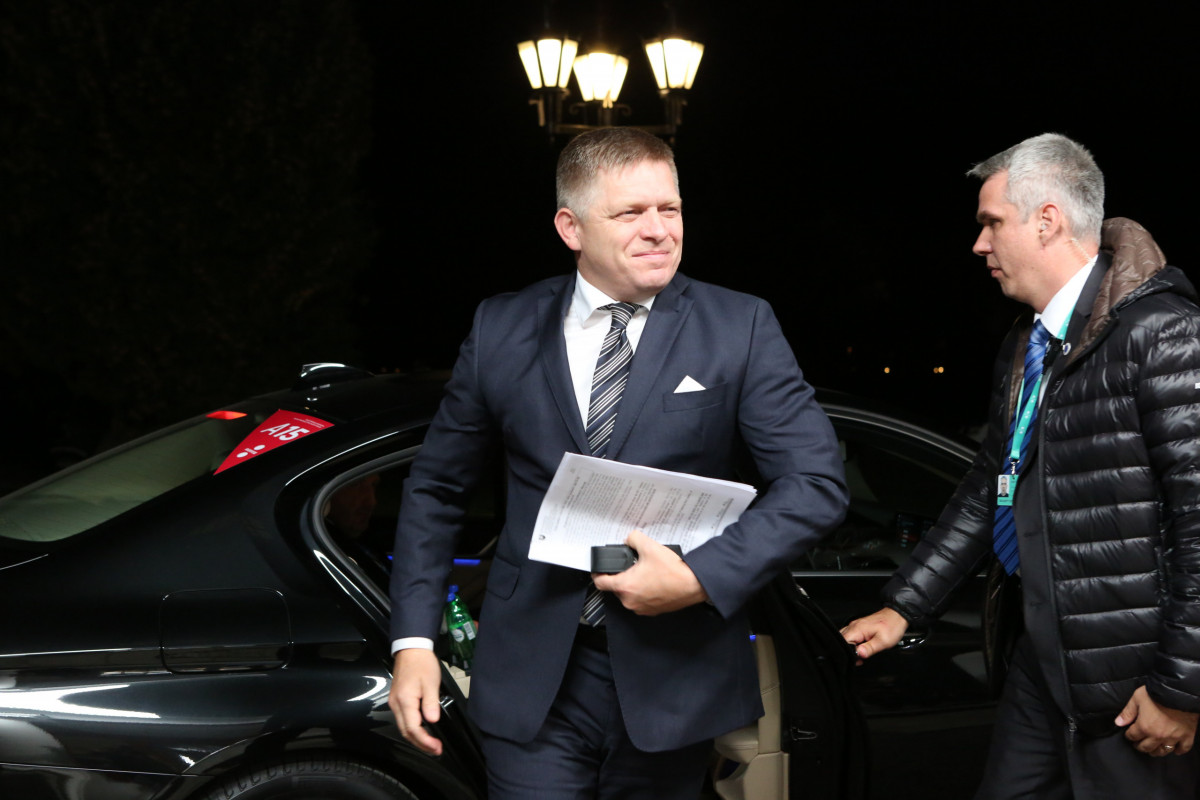By Peter Bárdy, editor-in-chief Aktuality.sk
Fico heads into elections driven by anger, revenge, and desire for power—and for salvation.
If there is one thing for which Robert Fico has real talent, it is perceiving the mood of society and raising issues that resonate and have an immediate political effect. And he does not give up .
When he resigned as a prime minister in 2018 after the murder of Ján Kuciak and Martina Kušnírová, he told President Andrej Kiska, “Mr President, be calm, I’m not going anywhere, I want to be an active chairman of a political party,” even though it seemed like his end was imminent. It seemed, too, that Fico’s time had passed, after the 2020 elections, which were won by the populist OĽaNO movement of Igor Matovič, who, for years, shouted that Fico was a mafioso and that the mafia belonged behind bars. But even then – when Fico’s party was crumbling in his hands, some of Smer’s prominent leaders left him and founded a new party in the summer of that same year, it was evident that he was tired, disappointed, and angry—but determined to change that.
He stood up in front of the cameras and confidently declared that he was not done. That he had been betrayed and that he wasn’t going to quit.
When political commentators today reflect on why Robert Fico managed to break out of political isolation, they seem to miss the dimension of vengeance. And not only vengeance against the political parties that came to power in 2020, but also against his former colleagues. Vengeance against those to whom he gave an opportunity for political, social and economic growth and prosperity in the guise of Smer, which ruled for three terms. “The nation always likes betrayal, but hates traitors,” he told outgoing ex-Premier Pellegrini and company when they founded Hlas party.
In the summer of 2020, a plan for revenge; a plot to rescue himself and his companions; and a path to a return to power was born.
The enormous vulnerability of the Slovak population to disinformation; the dilettantism of the political establishment that formed the government after the 2020 elections; the negative impact of the coronavirus pandemic on trust in the state and institutions; and Fico’s political willingness to pick up for even those topics that, until recently, belonged to conspiracy theorists all opened up new possibilities for the former three-time prime minister.
Fico is a cynical political pragmatist who is willing to use anything if he can profit from it. And so he has quickly come to understand the politics of the so-called illiberal democracy represented in Europe by Viktor Orbán.
Ironically, before the 2010 elections, Fico considered Orbán a threat to Slovakia. He later became his ally in the V4. This was especially true after Fico began to transform himself into a conservative nationalist. There he had quite a lot in common with Orbán, although the Hungarian prime minister never made any secret of his critical view of the 20th century division of Europe, and especially of the Treaty of Trianon, which saw Hungary lose roughly two thirds of its territory to its neighbors, including Slovakia after the WWI.
This did not particularly disturb Fico, since his conservative nationalism was primarily for voters who are attracted to this kind of conservative values.
This “new” ideology of national-conservative populism suited Smer’s leader politically. Such a movement would allow the interests of ethnic, religious, and LGBTQI minorities in the state to be ignored (hence illiberalism), would make his own grip on the state more authoritarian, and would generally restrict freedoms and human rights. When the nation is perceived as an ethnically and religiously homogeneous entity, this “populist” Trumpism offers them protection of traditional values, rule of order, restriction of immigration, protection from LGBTI+ issues, defence of national interests, and so on.
What Orbán had been saying for years could now fit into Fico’s own concept of politics. He was adopting Orbán’s narratives and they were becoming more and more aligned.
The hybrid war that Russia has been waging against the West for several years is even more to their advantage. Fico almost immediately won over those who have succumbed to the disinformation campaign that would have the world believe there were fascists in Ukraine who were killing innocent ethnic Russians; that Putin had to defend Russia’s interests against NATO; that Moscow is the only defender of Slavic, Christian interests and traditions in an increasingly rotten Europe run by elites, often very weak ones, where women are rising to the high levels of politics. That it is necessary to fight against the alleged homosexual lobby, against the liberalisation of the continent, against refugees, even against fascists. And a fascist, for them, is anyone who speaks out against illiberalism. Most often they are liberals.
During the coronavirus pandemic, Fico, the chairman of Smer, became one of the main leaders of the Slovak conspiracy-disinformation scene. He was aided in this by Smer MP Ľuboš Blaha, whose hate speeches and posts gained him a huge following on Facebook. Fico’s own current rhetoric is similar.
Last autumn, Fico said that “President Zuzana Čaputová is Soros’s child,” questioned democracy in Slovakia by claiming that “we are the only country in the world that cannot organise early elections,” and lied that the president had ruined the chance for a referendum (which, by the way, did take place).
He systematically undermines trust in the state, in its institutions, in representative democracy, in the system as a whole.
From the beginning, Smer has refused to help Ukraine defend itself against Russia’s aggression. Ex-Prime Minister Eduard Heger, with ex-Defence Minister Jaroslav Nad and President Zuzana Caputova, were called “fools” who might declare martial law so that there would be no early elections in September. Smer’s leaders further insinuated that Slovak soldiers might go “to fight alongside the Bandera fighters,” with MP Blaha adding: “This is a real threat. Families will lose their sons, women will lose their men.”
Fico was still rising in the polls. He was setting the agenda. He rallied the anti-establishment crowd against the head of state, who, in Smer propaganda, represented everything bad that has happened in the state since the murder of Ján Kuciak and Martina Kušnírová.
Still, he needed to find a real political challenger. This took him a long time
In that summer of 2020, Peter Pellegrini broke away from him and founded the Hlas (Voice) party, and so it seemed for a while that the Voice would be the favourite for the next elections. But Pellegrini fell victim to political passivity, an inability to reach out to voters with his own programme. This was mainly because Hlas had an almost identical electorate to Smer. And when Fico called for people to take to the streets to fight for their civil rights, which had been taken away from them by the government and “liberal” politicians, Pellegrini waited quietly. He could not muster a response that might have come into conflict with his former party boss. He was afraid.
After all, Smer has been said for years to not do anything that contradicts the opinion of its voters. To carry out opinion polls as often as they can. So when the polls showed that Fico should lead a movement of resistance and hatred against governments after 2020, he did so without giving it a second thought. Pellegrini was in a more difficult situation. The polls were showing him the same, only he wanted to break away from Fico. And so he just waffled, staggering aimlessly from topic to topic. All he could do was smile from billboards or social media posts.
Today, he knows that smiling is not enough.
But Fico is already the clear favourite for the election.
His theoretical challenger may yet be the Progressive Slovakia (PS) party. Liberal, modern, pro-western party led by vice president of European parliament, novice in Slovak internal politics Michal Šimečka. It is worth recalling the pre-election polls before the 2020 elections, which drew optimistic figures for PS, at the time without Šimečka, of even more than 15 percent, and the party, which was in coalition with Spolu, did not make it into parliament after all.
Today, however, they are in a different position: they are not political newcomers and are managing less self-inflicted damage, they are not trying to form a big coalition bloc (which, again, would require them to clear a higher electoral percentage), they seem to have really put their egos aside, they are sticking to one electoral line.
Fico is driven forward by the desire to get revenge, but also to salvage himself. A probe into the scandals of his reign, which surfaced during the investigation into the murder of an investigative journalist and his fiancée, is already pointing at people very close to Fico. The former special prosecutor Dušan Kováčik, who worked for the mafia in exchange for money, has finally been convicted. The police are still investigating Fico’s closest political associates and oligarchs lurking in the background behind Smer. For Fico’s world to keep spinning, this must be stopped.
Will Fico win the elections? It is possible that he will. Will he form a government? That is also quite possible, although we can imagine some circumstances that could prevent it. Will Slovakia go the way of Orbán’s Hungary if Smer governs? The answer to this question is also in the affirmative—unfortunately. Robert Fico has crossed the Rubicon. The politician who at the turn of 2017/2018 had a vision that Slovakia would sit securely at the very core of Europe is leaning towards the Eurosceptic side and only two things are stopping him from openly proclaiming withdrawal from the EU: European funds and lessons from the story of Great Britain. Fico looks at this in a similarly pragmatic way as Orbán, who has created a new oligarchy with European money. An oligarchy of his own.
In any case, the 2023 elections are extremely important for Slovakia’s future. They could change Slovakia’s position in the EU and NATO, where we have been a reliable partner against all odds for a very long time. They may negatively affect the quality of democracy and human rights, and may extinguish the faintly glowing light at the end of the tunnel that is still showing us which direction we should take.
Peter Bárdy is a Slovak journalist, commentator, and, since 2008, editor-in-chief of the online newspaper Aktuality.sk. Under his leadership, the newsroom of Aktuality was reorganized. Today it is well known for its focus on investigative journalism.
The views and opinions expressed on our blog are those of the authors, representing a wide range of viewpoints, and do not necessarily reflect the position of VSquare or our affiliated organisations.







